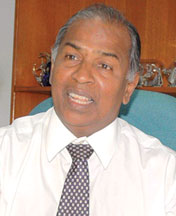Pelwatte milk powder in market soon
By Lalin FERNANDOPULLE
The milk powder plant at the Pelwatte Dairy Industry built at a cost
of Rs.one billion will be commissioned shortly, said Chairman, Pelwatte
Dairy Industry, Ariyaseela Wickramanayake.
He said around 150,000 litres of milk will be produced a year through
the state-of-the-art factory. The Pelwatte complex which is spread
across 12,000 hectares provides employment to around 25,000 farmer
families with around 10,000 direct jobs.
 |
|
Ariyaseela
Wickramanayake |
“The Pelwatte Sugar Industry makes a salient contribution to the
manufacture of sugar in the country. The factory has a capacity to
produce around 27,000 mt of sugar a year”, Wickramanayake said.
The annual consumption of sugar in the country is around 500,000 mt
of which around 80 percent is imported.
“The huge drain of foreign exchange has to be curtailed if the
country is to promote agriculture and be self-sufficient in food”,
Wickramanayake said.
He said the country’s annual import cost on wheat is equal to the
investment made on the Mahaweli Development Project which has sustained
agriculture for decades.
Sri Lanka imports around one million metric tonnes of wheat a year at
a cost of around US$400 million. The import of milk powder costs the
country around US$300 million annually.
Rice is the main food in Sri Lanka and the harvest of paddy last year
was around five million mt.
The production of paddy in the country is around 2.7 million mt.
Wickramanayake said people should consume more rice flour based products
if they are to save on escalating global food prices. Global food prices
have risen over the years due to climate and consumption pattern
changes.
The country has around 1.5 million cows of which only 250,000 are
milked.
The dependence on cheap imported milk has deterred growth of the
dairy industry. “More development projects similar to Mahaweli and
Hambantota should be launched to save the drain of foreign exchange and
accelerate development in the country”, he said.
Wickramanayake said that there is a good response to the Ganna Ape De
logo of the Mauwbima Lanka Foundation which promotes the use and
consumption of locally produced items.
He said around 120 companies are using the logo to promote indigenous
products and reduce the import of foreign products. Another 40 companies
will obtain the logo this year.
|

